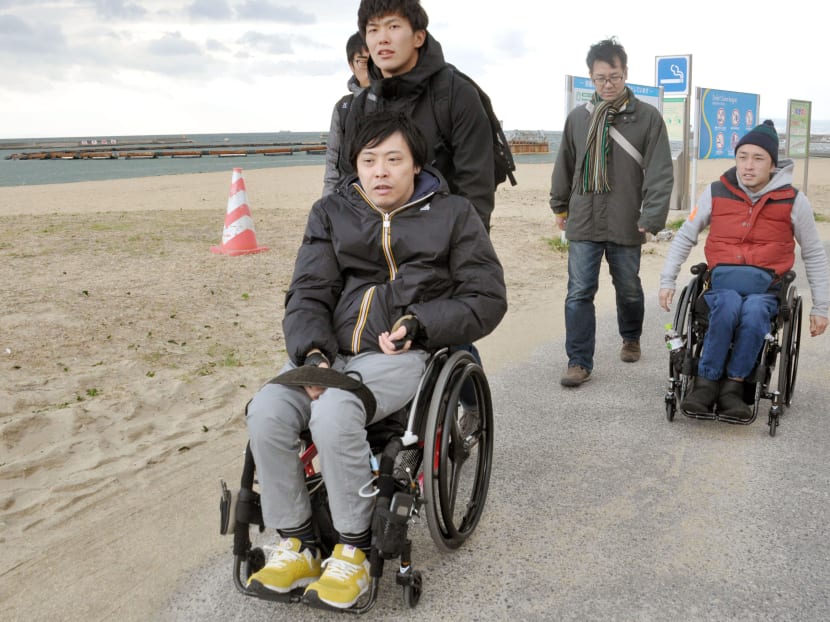Wheelchair users aim to make beach barrier free for the disabled
KOBE — Two wheelchair users are spearheading a drive to make it easier for the disabled to enjoy the beach by placing plastic mats on the sands to make it easier for them to move.

Mr Shinya Furunaka (front) and Mr Shunsuke Kido (back)
assessing the suitability of Suma Beach in Kobe, Japan, for wheelchair users. Photo: Kyodo
KOBE — Two wheelchair users are spearheading a drive to make it easier for the disabled to enjoy the beach by placing plastic mats on the sands to make it easier for them to move.
The goal is to create an inclusive beach using universal design (UD) principles, said the two wheelchair users: Mr Shunsuke Kido, 31, an event producer from Kobe, and Mr Shinya Furunaka, 37, a company employee from Osaka.
Mr Kido has paralysis in his lower body from a spinal injury he suffered in a traffic accident in 2015, while Mr Furunaka suffered a cervical spine injury in a river accident in 2003 and serves as a lifeguard at the Kobe Life Saving Club.
Their group comprises volunteers are applying UD principles to a beach in Hyogo prefecture in western Japan. UD is a set of ideas to make buildings, products and environments accessible to all people, including the aged and people with disabilities. Over the past few months, Mr Kido and Mr Furunaka examined Suma Beach in Kobe together with owners of summer beach houses, life savers and other people concerned. Mr Kido found his wheelchair stuck in sand on the beach and could not move.
Mr Kido was inspired by his experience on an Australian beach, after spending half a year for his physical rehabilitation there.
At a beach in the country, he was able to proceed to the edge of the surf by riding his wheelchair on plastic mats laid on the beach.
“I was overwhelmed by senses of achievement and freedom beyond expression,” he said. He hoped to lay the mats on a Japanese beach too.
After returning to Japan, Mr Kido talked to his friends about his plans to make a Japanese beach accessible. He selected Suma Beach, with which he was already familiar. Supporters soon came forward. Mr Furunaka and other members of the life saving club joined in.
Mr Kido had heard wheelchair users say “I’ve never thought of visiting a beach” or “I wanted to visit but couldn’t before.”
He therefore hopes to “increase options” of enjoyment for them by making a beach barrier-free. The group led by Mr Kido and Mr Furunaka is now planning to buy plastic mats from abroad to put on the beach, with capital to be raised by crowdfunding.
They also plan to address problems such as uneven roads near the beach and the absence of an elevator at the exit of a nearby railway station.
They hope to cater to people with other disabilities as well. Elsewhere in Japan, Wakasa Wada Beach in Fukui prefecture and Oarai Sun Beach in Ibaraki prefecture have introduced accessibility programmes such as offering wheelchairs designed for use on the beach or laying plywood boards on the beach. KYODO






